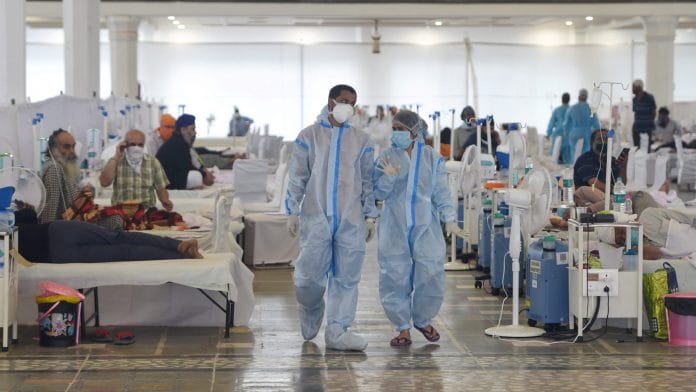New Delhi: Scientists from two Indian research agencies — National Centre of Disease Control and Council of Scientific and Industrial Research (CSIR) — confirmed that the Delta variant’s increased infectivity and ability to evade neutralising antibodies made it the most dominant variant in India and other countries like the UK.
Using data from Delhi and UK along with lab experiments on miniature organs, the researchers worked in tandem with a team at the University of Cambridge to examine how well the Delta variant of SARS-CoV-2 was able to evade immune response.
In a study published in the journal Nature Monday, they noted that Delta is better at replicating and spreading than other variants of the virus.
“There’s also evidence that neutralising antibodies produced as a result of previous infection or vaccination are less effective at stopping this variant,” said Ravi Gupta, one of the study’s senior authors from University of Cambridge, in a statement.
Gupta further noted that the variant was likely behind the aggressive second wave of the pandemic that India witnessed in April-May this year, which overwhelmed health infrastructures across the country.
“These factors are likely to have contributed to the devastating epidemic wave in India during the first quarter of 2021, where as many as half of the cases were individuals who had previously been infected with an earlier variant,” he said.
First identified in late 2020 in India, the Delta variant or B.1.617.2 was designated as a ‘Variant of Concern’ by the World Health Organization in May because of its increased transmissibility.
Since then, it has spread across the globe and according to study researchers in the UK, nearly all new cases of Covid in the country are caused by the Delta variant.
Also read: India’s R drops to 1.11 as several states see slowdown in Covid spread
‘Selection advantage’ of Delta variant
For the study, the team used 3D airway organoids or ‘mini-organs’ grown from cells from the airway of human lungs that mimic behaviour of the original cells in this study.
They used both a live virus and a ‘pseudotyped virus’ — a synthetic form of the virus that mimicked key mutations on the Delta variant — to infect the organoids and observed the behaviour of the virus in the respiratory tract.
According to the study, the Delta variant was more efficient at breaking into cells compared to other variants. It was also found to be better able to replicate itself.
Both these factors give Delta a ‘selection advantage’ compared to other variants, the study noted, which explains why it has become so dominant. Selection advantage refers togaining a trait that gives an organism or a variant greater chances of surviving and reproducing.
“The Delta variant has spread widely to become the dominant variants worldwide because it is faster to spread and better at infecting individuals than most other variants we’ve seen. It is also better at getting around existing immunity — either through previous exposure to the virus or to vaccination — though the risk of moderate to severe disease is reduced in such cases,” said Partha Rakshit from the National Centre for Disease Control, Delhi, India, joint senior author, in a statement.
The study authors also noted that the spread of the Delta variant among healthcare workers is especially concerning since they could infect individuals with compromised immune systems.
“Although they (health workers) themselves may only experience mild COVID, they risk infecting individuals who have suboptimal immune responses to vaccination due to underlying health conditions — and these patients could then be at risk of severe disease,” noted Anurag Agrawal, director of the CSIR Institute of Genomics and Integrative Biology and joint senior author of the study.
“We urgently need to consider ways of boosting vaccine responses against variants among healthcare workers. It also suggests infection control measures will need to continue in the post-vaccine era,” Agrawal added.
Also read: Cases of Ivermectin overdose rise in US as misinformation fuels demand for controversial drug
Vaccines and Delta variant
The team of researchers also extracted serum from blood samples collected from individuals in the UK previously been infected with the Covid or fully-vaccinated with either the Oxford-AstraZeneca or Pfizer vaccines. Serum contains antibodies raised in response to an infection or vaccination.
They found that the Delta variant virus was 5.7-fold less sensitive to the sera from previously-infected individuals and as much as eight-fold less sensitive to vaccine sera, compared to the Alpha variant (which was first identified in South Africa).
This means that it takes eight times as many antibodies from a vaccinated individual to block the Delta variant of the virus while over five times more antibodies are needed to block the lineage in a recovered patient.
Researchers in Delhi also analysed over 100 infected healthcare workers from three hospitals, nearly all of whom had been vaccinated against SARS-CoV-2, and found that the Delta variant transmitted between vaccinated staff to a greater extent than the Alpha variant.
(Edited by Rachel John)
Also read: Mu — the latest SARS-CoV-2 ‘variant of interest’ first found in Colombia






